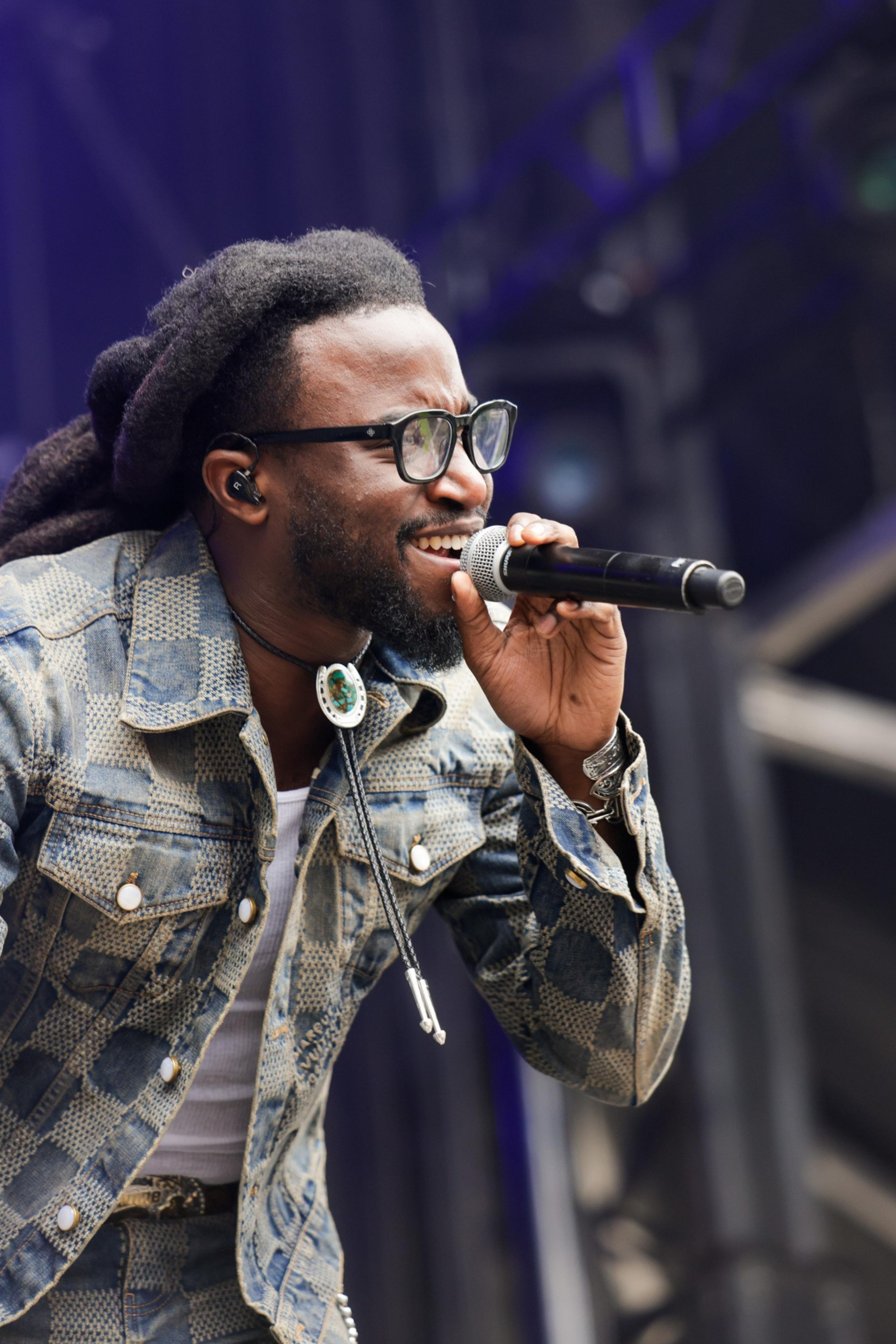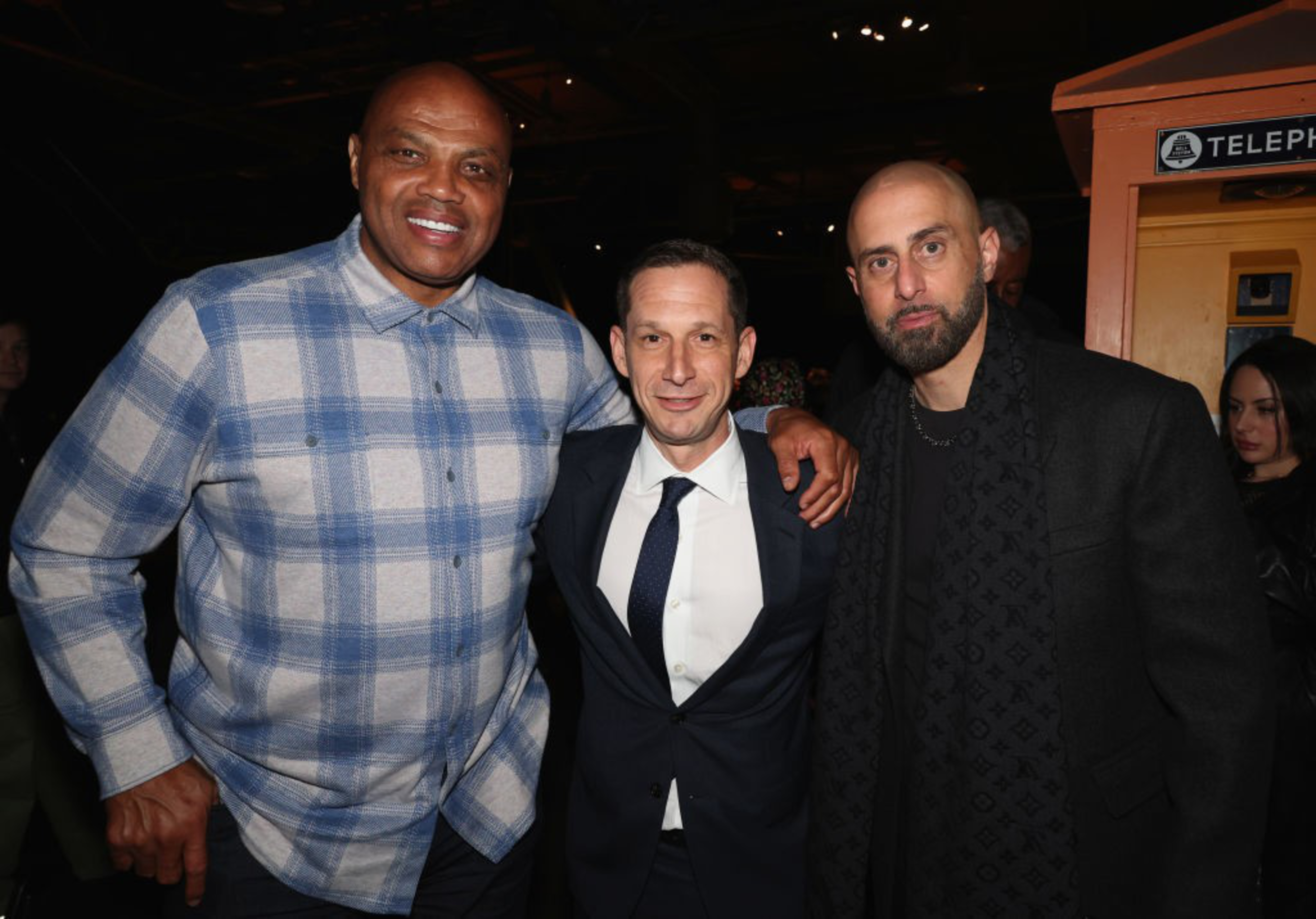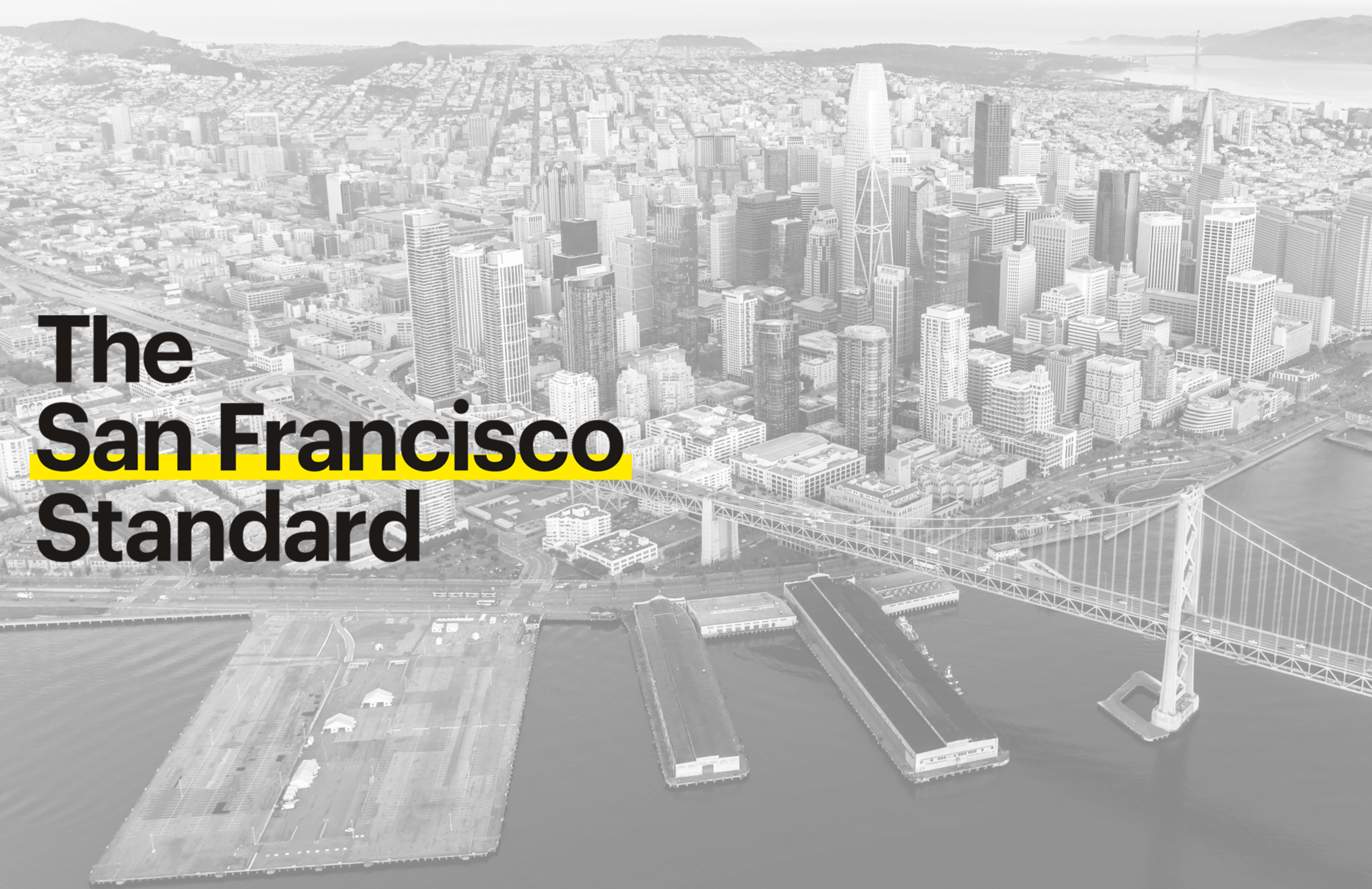Ghazi Shami’s $800 Prada sneakers softened his footfalls through the main hall of 1 Montgomery St., formerly home to Crocker National Bank.
Ghazi — who uses only his first name professionally, as the head of record label Empire (opens in new tab) — was just 5 when his mother brought him to a Crocker National branch to make some deposits, and a kind teller gave him a stuffed dog — a “Crocker spaniel.” He slept with it for years. “Fast forward like 40-something years later,” he said, “and I bought Crocker Bank.”
Strictly speaking, Wells Fargo bought the bank. But Ghazi and his San Francisco label purchased 1 Montgomery in January for around $20 million, part of the ongoing shakeup in downtown San Francisco commercial real estate. An ally of Mayor Daniel Lurie and a diehard believer in the city, Ghazi, 48, has spent 15 years building a music empire that just happens to be called Empire.
It is the San Francisco native’s hope that downtown’s salvation may arrive in the form of a business many people wrote off: the music industry.

1 Montgomery St., an Italian Renaissance Revival building with imposing pillars and a grand interior, is only three stories tall — but it is statement architecture all the same. Pointing out the skylight, the basement, and a 1908 vault he hopes to transform into a private club, Ghazi openly invites the comparison to the most famous record label headquarters in the world, the cylindrical Capitol Records tower crowning Hollywood and Vine in L.A.
“Retaining the authenticity is the most important thing to me,” he said. Empire, he added, “can get as big as it wants to get.”
The house Shaboozey built
While other San Francisco record labels are small and focus on a single genre, Empire is a major industry player.
The label has produced huge R&B stars like Anderson .Paak, up-and-coming singer-songwriters like Raveena, established glam-pop crooners like Adam Lambert, and SF-born rappers like Larry June, much of their work recorded at Empire’s studio on Bryant Street in SoMa. In 2022, Empire expanded into electronic music by acquiring Dirtybird (opens in new tab), the house-and-techno label that grew out of a series of barbecues in Golden Gate Park. Empire’s most recent partnership is with K-Pop megastar Jisoo, a member of Blackpink, often called the biggest girl group on Earth.


Building out 1 Montgomery St. and moving Empire’s 150 San Francisco employees from the current offices on Pine St. will take years, but Ghazi wants the future headquarters — and its roof deck — to be a place so cool, his employees don’t want to go home. “They’d rather be at the office,” he said. “I think I can create that texture here.”
It would be inaccurate to describe Empire as merely a label. With several hundred employees across five continents, it’s a vertically integrated entertainment brand that encompasses production, distribution, and artist management. True to its hometown roots, it even has a tech arm: Ghazi created proprietary software to distribute music to platforms like Spotify and Apple Music while generating metadata that helps his team promote and refine its stable of talent.
Perhaps its marquee name is singer-songwriter Shaboozey, who featured on two tracks on Beyoncé’s landmark album “Cowboy Carter” and whose 2024 single “A Bar Song (Tipsy)” spent more time at the top of the chart than any other song in history — 19 consecutive weeks, to be exact. Empire didn’t discover Shaboozey; in Ghazi’s telling, the company merely “magnified” who he already was, helping him go from 400,000 monthly streams to nearly 10 million and “touch the four corners of the Earth.” It’s a mutually beneficial arrangement. “Everybody’s winning,” Ghazi said.

Ghazi, who was raised in Potrero Hill and went to San Francisco State, seldom grants interviews. He is Palestinian American, and his uncle ran New Potrero Market on 18th Street. He exudes a soft-spoken confidence tinged with the spiritual-capitalism ethos of the Davos set. His head is shaved, and his beard is trim.
An engineer, Ghazi got his first recording studio at 18 and essentially dedicated his life to hip-hop. In his early 20s, he produced a recording for rapper The Game, which found its way to Dr. Dre and got the artist signed to Dre’s Aftermath Records. Ghazi never stopped. More than 20 years later, as music industry titans consolidate and contract, Ghazi stands apart. He will never leave San Francisco, he says. He will always stay independent.
Though he’s focused on running Empire, Ghazi remains a producer at heart, spending at least 10 hours a week in the studio, sometimes more. He mixed the latest album by Atlanta Rapper Money Man, which came out in March.

Ghazi wants to fuel San Francisco’s renaissance from 1 Montgomery. He envisions it as a cultural heart of the city, a combination office and venue, incorporating elements from the members-only social club The Battery, Dogpatch gallery and restaurant RH, and the recently renovated Transamerica Pyramid. Above all, he is ready to put all talk of the “doom loop” to bed forever — preferring to describe San Francisco’s current state as “not what Ron DeSantis says it is.” Estimates of Ghazi’s net worth hover in the $50 million range (opens in new tab), and his ambitions seem to have reached an all-time high.
“Who knows, maybe I’ll buy a small bank and make banks my thing,” he mused. “Maybe I’m the one that gets us to Mars?”
February’s NBA All-Star Weekend was a feather in Empire’s cap — and not merely because Shaboozey was front and center, playing in the celebrity game and performing “A Bar Song.” It also gave Ghazi a chance to flex his proverbial Rolodex of power brokers at the highest level. He had been introduced to former NBA power forward and well-known San Francisco hater Charles Barkley by “Inside the NBA” commentator Kenny Smith. At Smith’s poker tournament, Ghazi caught Barkley’s eye just as Lurie walked in the door. He introduced them — and the results were huge for the city.

As Ghazi tells it, Barkley spent the morning volunteering at Glide Memorial, a Tenderloin church that feeds the neighborhood’s low-income populations. The mayor pressed him on what he would do to improve the city, and out of that conversation, Barkley made a $250,000 donation to Glide — turning “an L into a W,” Ghazi said.
An individual close to the mayor corroborated that a positive conversation occurred. Lurie did not press Barkley for a donation, the source added, but “it clearly resonated with Barkley, and you can see that reflected in his comments about the mayor on air after they had met.”
Ghazi has been in regular touch with Lurie’s team since before the election. Mayoral spokesperson Han Zou confirmed that the two share a vision for revitalizing downtown through culture. “The mayor and Ghazi have a great relationship,” Zou said.
‘Make the Bay Area the biggest dance floor’
Empire’s involvement in bringing energy back to downtown predates Lurie’s tenure as mayor. Through Dirtybird, the label that has essentially become Empire’s dance division, the company helped produce “Back to Baysics,” a free outdoor rave that brought tens of thousands to the Embarcadero in July for Sacha Robotti, an established Belgian-born DJ. The event was a coproduction with hometown promoter Another Planet Entertainment, and Empire also has a partnership with San Francisco’s other big venue owner: Goldenvoice, the local affiliate of AEG Entertainment. Other outdoor parties are in the works, including a Father’s Day rave similar in scope to Back to Baysics.
It is through Dirtybird that Empire is anchoring itself to EDM-loving Northern California. The appeal of electronic dance music may be somewhat narrow, but it is also very deep. When the lineup dropped last week for Northern Nights, a three-day camping festival that Dirtybird is now coproducing, fans celebrated (opens in new tab) with near-universal approval, hailing it as some bass-heavy Second Coming.
This happened largely because Ghazi let Dirtybird operate as an independent subsidiary. (“I don’t want to fuck up what you built,” he says he told the founders during the acquisition in 2022.) Moody Jones, the general manager of Dirtybird, said he and Ghazi see eye to eye. “We have the same goal, and it’s to make the Bay Area the biggest dance floor.”
On Tuesday, Empire will celebrate 415 Day (opens in new tab), the street party held every April 15 as an homage to the city’s area code, with a free, all-ages event at Spark Social in Mission Bay.
While the buildout at 1 Montgomery St. is likely to take three years or more, at least one element at the future headquarters is already in place: a new stuffed Crocker spaniel, a gift from one of his employees. “I’m trying to find the original one,” he said, “but she got me one that looks just like it.” Together, they’re captains of a true empire.
